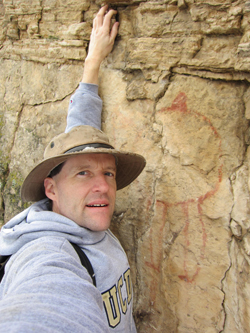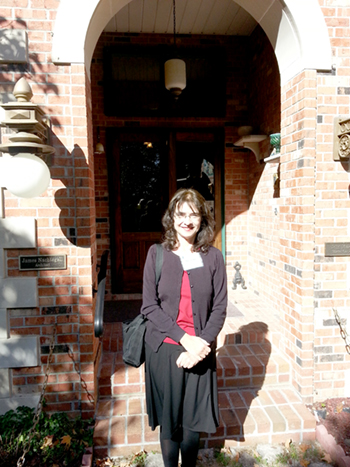 Posted January 11, 2013, By Scott Herring: I keep running into the belief, held by a number of prominent bloggers, that online education is poised to replace the traditional university. They arrive at this view by following a logical equation: higher education is so expensive that it has drifted over the line into usury or simple theft. Because the virtual university will be so much cheaper, capitalism will elevate it and destroy its ivy-and-mortarboard rival. Not everyone accepts this proposition.
Posted January 11, 2013, By Scott Herring: I keep running into the belief, held by a number of prominent bloggers, that online education is poised to replace the traditional university. They arrive at this view by following a logical equation: higher education is so expensive that it has drifted over the line into usury or simple theft. Because the virtual university will be so much cheaper, capitalism will elevate it and destroy its ivy-and-mortarboard rival. Not everyone accepts this proposition.
Minding the Campus has recently run a number of skeptical essays, about the internet itself, the effectiveness of online instruction, and the Massive Open Online Course. At Phi Beta Cons, Jason Fertig pulls together a wide range of views.
Like them, I am going to have to rain on the parade, in this case all of it.
People love to predict the coming destruction of traditional higher education by the hard hand of iPhones because they believe the iPhones will also destroy the leftist dictatorship that is the contemporary university. Unfortunately, the group that makes this prediction is drawn from among the people who read websites like, um, Dissident Prof. In an apocalyptic scenario that has become standard, the practical people, the technology people, destroy the temple. The leftist humanities professors, who presently are subsidized and thus free to expound destructive, vicious, and—most important, at this juncture—impractical theories, are driven forth by the triumphant techies.
It is not going to happen, but you will have to be patient and let me show you why. I also have the perfect alternative, which I will hold back until the end.
Online education obviously has a bright future, because it has a bright present. The first example that comes to mind, often, is the University of Phoenix. Like nearly every business, they have fallen on hard times lately, but still enroll well in excess of 300,000 students, as I write this. Look past them, and we see online education happening everywhere. I got caught in a speed trap last year (drivers, just stay away from California: governments at all levels get much of their money from speed traps). The traffic school option was available online. At my university, all faculty are regularly required to take courses on sexual harassment and the like, mandated by the state, of course, and we take them online. The companies that offer them make money.
There is, however, a natural ceiling for the industry. Harvard will never be replaced by www.ivy$$$.com, obviously. Neither will well-funded public schools like my own University of California. But all the other different kinds of colleges in the world—remarkably varied, if you think about it—are not going anywhere.
 People looking forward to an online apocalypse for traditional higher education will often point to the unserious nature of campus life, where the kids run up fantastic student loan tabs, and then spend all their time getting reeling-drunk at the frat house. The reaction is a normal one, and fraternity row has much to do with it. Anyone past the age of about 22 cannot fail to be appalled by those houses, hip-hop blaring out the windows, garbage on the dead lawn, so much dirty laundry available that it is beginning to spill out the doors. We never see the positives: that the kid getting drunk with the frat-house gang is, at the same time, cementing a circle of friends that will likely endure for the rest of his life. Academics, who were mostly brainy, geeky types as undergrads, never see this. The frat boy will have, forever, a network he can call on in good times and bad.
People looking forward to an online apocalypse for traditional higher education will often point to the unserious nature of campus life, where the kids run up fantastic student loan tabs, and then spend all their time getting reeling-drunk at the frat house. The reaction is a normal one, and fraternity row has much to do with it. Anyone past the age of about 22 cannot fail to be appalled by those houses, hip-hop blaring out the windows, garbage on the dead lawn, so much dirty laundry available that it is beginning to spill out the doors. We never see the positives: that the kid getting drunk with the frat-house gang is, at the same time, cementing a circle of friends that will likely endure for the rest of his life. Academics, who were mostly brainy, geeky types as undergrads, never see this. The frat boy will have, forever, a network he can call on in good times and bad.
Both the little college and the big university serve functions so broad we miss them because they are so big and pervasive. Their major function is to gather large numbers of people, of relatively high intelligence, who aspire to belong to the same profession and social class, then jam them together in the same physical space for long periods of time. That is their killer app, and it will never become obsolete. The effects are vast. Let me pause and inventory them.
The institution brings all those professors together, and—when they are not fighting like alley cats—they have stray conversations in elevators and hallways that lead to world-changing ideas. The scientists do, at least, and the humanities professors might, if the hiring committees strayed from the present practice of making sure that everyone thinks the exact same thoughts. The students learn how real science and engineering is done by actually doing it, hands-on, while the computer screen can only show them photographs of other people doing it, maybe, which is just not the same. After class, they are dating and meeting their future spouses. They are doing so face to face, so that they can draw on a thousand sensory cues to tell them whether this person is a lunatic or not. On Match.com, fibbing is the norm.
I have seen people argue that old-fashioned universities will linger in a half-life, providing services like medical education that require things like corpses to cut up before the young surgeon turns the knife on a living person. Vocational learning, surely, will move entirely online. Nope—sorry. Vocational education must be hands-on too, or at least the most crucial moments do. The apprentice mechanic has to practice on a real car. Would you prefer the mechanic who is doing your brakes to be a new hire on his very first brake job, a new hire with an online degree who has never picked up a wrench, has in fact only looked at a bunch of PDFs?
In the end, also, the University of California degrees that my colleagues and I help produce have a glow about them that the online degrees will never match, for obvious reasons. Like it or not, commerce has a dinginess about it compared to the Life of the Mind, and it has for millennia. I am not defending the situation. I am just saying that that is the way things are. It does not help that the University of Phoenix office building down the freeway from me is identical to the glass monolith Dilbert works in. Compare the pomp and circumstance of the old-fashioned university graduation ceremony: I adore wearing my doctoral robes, because they make me look like a 13th century Florentine assassin (we even wear those cool octagonal velvet beanies). Nor will online education ever overcome the one insuperable handicap that no one wants to talk about: cheating. The people giving the exams will never have a way to ensure that the people taking the exams are not just getting answers out of Wikipedia, open in a second window. We will hear, for years to come, about security technology that will eliminate such cheating, but hacking is part of online culture. The technology will be breached the day it is released.
All these features of traditional higher education explain one phenomenon I cannot help seeing all day, now that I have thought hard about it: for years, we have been complaining about a higher education bubble that is going to destroy the nation right now, and the destruction never happens, and no one ever does a thing about the problem.
Of course not. No radical change is coming. We can do some learning online—we already do—but the functions I have merely sketched above are just too important. People who like online higher education object to the running tuition hikes that underwrite administrative waste and greed. The waste and greed are appalling, and we should do anything in our power to get them under control, including moving coursework online, if that does the trick. The waste at my own university system is mind-bending. I would have written about it on Dissident Prof, but 1. I have an English major’s head for figures, and 2. I am in the position of an FBI accountant taking an initial look at a Mafia family’s finances: I have no idea where the money is coming from.
 However, tuition goes up not just because the administration is buying swimming pools and rock climbing walls. At universities, we do not benefit from productivity increases the way the whole rest of the economy does. In my department, medium-sized groups of young adults come together to listen to an older adult talking about the subject at hand, which the older adult has thought about pretty hard. The older adult then responds, in deep and individualized detail, to the youngsters’ attempts to master the ideas. That is the way I do it. That was the way Socrates did it. We have had no productivity gain in 2,500 years.
However, tuition goes up not just because the administration is buying swimming pools and rock climbing walls. At universities, we do not benefit from productivity increases the way the whole rest of the economy does. In my department, medium-sized groups of young adults come together to listen to an older adult talking about the subject at hand, which the older adult has thought about pretty hard. The older adult then responds, in deep and individualized detail, to the youngsters’ attempts to master the ideas. That is the way I do it. That was the way Socrates did it. We have had no productivity gain in 2,500 years.
We have to face facts. The university will look much the same in a hundred years. We have to work with what we have. The job at hand is to make the humanities sane again, and pipe dreams about the English Department being wiped out by Terminators are only a distraction.
Let me end, however, on a big positive, and one that is not just intellectual NutraSweet. That desire for the Terminators to appear arises from the much more rational movement, associated with Andrew Breitbart and others, to create parallel institutions that bypass the traditional ones hijacked by cultural Marxists. Here is the happy part: such institutions already exist. We cannot create a parallel university system, and online education is not a cheap substitute. What we have already, and can expand, are places where the undergrads can escape the ideological atmosphere on campus, while staying on campus. I have seen studies—I forget where, but I will go ahead and say this because it conforms exactly with what I see every day—showing that undergrads are pulled to the left not by professors, but by their peers. The balding, ill-dressed professor frothing with Marxian rage looks, to an 18-year-old, merely like a weirdo. On campuses like Berkeley or Wisconsin-Madison, the cool kids are into the exact same thing as the weirdo, just dressed up in a more hip and simpler package. The thing to do is to provide places where the hipsters do not dominate the conversation, and we have such places. Campus Christian organizations are one, ROTC another.
 And do you know what a third one is? The virtual world. Online education may be a bad way to learn to be a mechanic, and a mighty bad way to learn to be a doctor, but as a source of information that the cultural Marxists suppress, it can hardly be beat. Look no further than this website.
And do you know what a third one is? The virtual world. Online education may be a bad way to learn to be a mechanic, and a mighty bad way to learn to be a doctor, but as a source of information that the cultural Marxists suppress, it can hardly be beat. Look no further than this website.
Scott Herring teaches writing and literature at the University of California-Davis. Before he got his Ph.D., he worked for years in Yellowstone Park, and still carries on a hopeless love affair with the place. In the photograph, he is hanging from a cliff therein.





